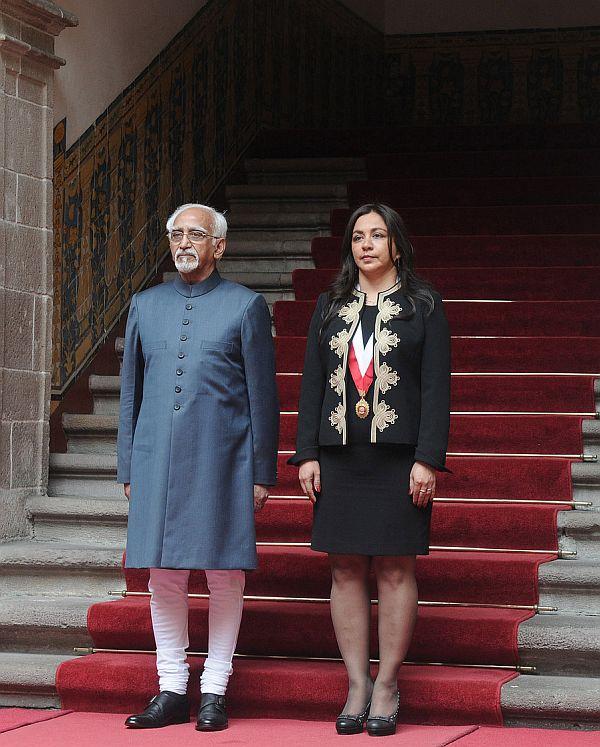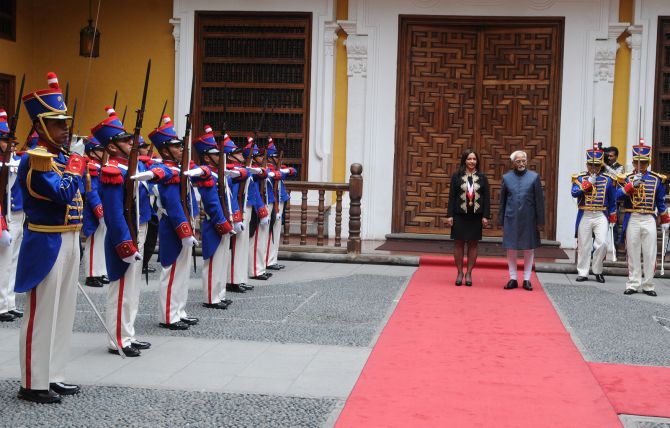Photographs: Ministry of External Affairs Nikhil Lakshman
Vice President Hamid Ansari’s visit is billed as a game-changer for India’s relationship with mineral-rich Peru, Latin America’s fastest growing economy. Rediff.com's Nikhil Lakshman reports from Lima.
After years of ignoring Latin America as not worth its while, India took one more decisive step towards acknowledging that region’s importance to its resource-needy future when it set up mechanisms and processes during Vice President Hamid Ansari’s meeting with the Peruvian leadership in Lima on Monday, October 28.
“For years, Latin America didn’t matter to us,” a senior Indian diplomat told Rediff.com on Monday evening. “That has changed now. We have realised distances don’t matter, and we can have relationships anywhere in the world. Latin America and India are natural partners”
Latin American countries like Peru, the diplomat felt, “are looking up to India. But we are somewhat shy of playing that role. I hope we can match their aspirations. The vice-president’s visit is certainly the trigger for a new 21st century relationship.”
His views were echoed by Dinkar Khullar, Secretary, West, at the ministry oif external affairs, who felt that the vice president’s three-day visit to Peru has “set the trend for the coming years after not much engagement in the first decade.”
Peru’s Minister of Foreign Trade Magali Silva Velarde-Alvarez says Peru hopes to be India’s “gateway to South America,” which is why the Peruvians pushed for a Free Trade Agreement with India at all the vice-president’s meetings. Peru already has 25 such FTAs, with countries like China (its biggest trading partner), Japan, South Korea and the United States.
The Indian side, however, played down the possibility of an FTA in the near future, saying it was a concept that needs to be investigated by India’s commerce ministry and could be taken some degree forward when Velarde-Alvarez meets her Indian counterpart, Commerce Minister Anand Sharma, in Bali later this year. Velarde-Alvarez, also her country’s tourism minister, hopes to bat for Indian hotel groups to set up hotels in Peru when she meets Sharma.
...
India's great leap forward in Peru
Image: The Vice President with Peru's President Ollanta HumalaPhotographs: Ministry of External Affairs Nikhil Lakshman
Four agreements were signed during the vice president’s visit:
- An exchange programme on education where India would offer scholarships to Peruvian students; send professors and students over to Peru; set up chairs on contemporary studies. Such emphasis was placed on education during the discussions that President Ollanta Jumala invited his Minister of Health Midori de Habich Rospigliosi -- a lady who had spent five years as a student in India when her father was the Peruvian ambassador to New Delhi – to his 30-minute meeting with Vice President Ansari on Monday evening.
- A Letter of Intent between the two countries on Museum Development and Promotion of Cultural Heritage. This is an area that India’s culture ministry -- which wanted a specific charter to work with the Peruvians -- could learn from what Peru has done to preserve its equally distinguished historical artefacts, given the state of India’s museums.
- An agreement on defence cooperation, which primarily translates into India offering Peruvian military officers a few slots at the prestigious National Defence College in Wellington, Tamil Nadu. India already has defence ties with Latin America -- Indian radar are mounted on Brazilian military aircraft; India has sold Dhruv helicopters to Ecuador; it has sold defence equipment to Columbia. Peru is also interested in sourcing spares and technology from India for its Russian military equipment though that is something the defence ministry in New Delhi will need to give final shape to. Peru’s military leaders are seen as largely anti-American and favour Russian and Chinese equipment. Peru has close defence ties with China; when both nations signed an MoU in November 2011, Guo Boxiong, the vice chairman of China’s Central Military Commission declared, ‘The current bilateral relations between China and Peru are one of the best moments of history.’
- The establishment of a Joint Commission, headed by the foreign ministers of both nations, is seen as the most definitive move towards a better relationship. It is only the third instance where India has such a commission in Latin America – Argentina and Brazil being the others. The vice president’s visit can only be a “catalyst”, Secretary Khullar told the media. The nuts and bolts will need to be handled by the ministry of external affairs which will convene a meeting of experts from other ministries and brainstorm on ideas and ways where India can engage with Peru better. The presence of such a Commission on the agenda can be notched up as a personal triumph for Ambassador Manpreet Vohra who first broached the idea to Joint Secretary (Latin America and Caribbean) Dammu Ravi who then took it forward with his Peruvian counterparts. The commission is a “vehicle for translating the discussions into actions,” Khullar said, adding, “We have had a period of relative quiet. This has changed significantly after this visit. Usually, after a bilateral visit, there are areas that may or may not fructify. Here, we have a specific number of areas that we can engage in.”
...
India's great leap forward in Peru
Photographs: Ministry of External Affairs Nikhil Lakshman
The vice president’s meetings were highlighted by unusual warmth, right from his encounters with President Humala (who more than once expressed his desire to visit India) to Foreign Minister Eda Rivas Franchini to the President of Peru’s unicameral legislature, Fredy Otarola.
Asked why the Peruvians wanted a better relationship with India, a senior diplomat told Rediff.com, “Most Latin American countries do not like China’s activism. They don’t like to be dependent on one country. They feel India can play a balancing role. They think India is a better partner, accountable, responsive. They are scared of the Chinese aggression, scared of compromising their sovereignty.”
Speaking later to Rediff.com, Joint Secretary Dammu Ravi felt the vice president’s visit was a “milestone.”
“These visits signal the importance India places on relationships with countries like Peru. Our vice president is a scholar and a diplomat. We must leverage his visit for better things to come.”




article